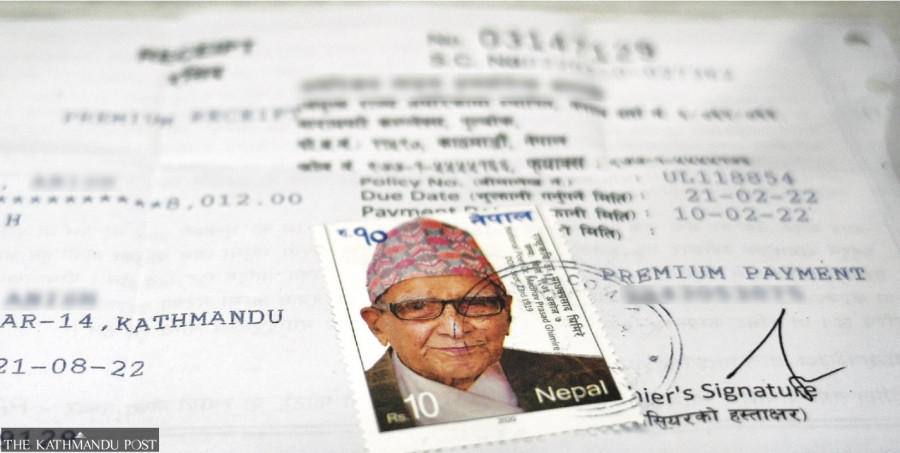National
Been to government offices? Affixed stamps on papers? Do you know why?
No one knows; even officials are perplexed. It is prescribed in a law dating back to 1963.
Anup Ojha
Last week Santosh Neupane went to the Transport Management Office in Chabahil to renew his driving licence. After standing in a long queue, when his turn came, he was told he needed to affix a postage stamp worth Rs10 on the application form.
He ran outside of the gate of the transport office to buy one, for which he paid Rs15, even though the actual price was Rs10.
“Rather than the five rupees extra I had to pay, I found it something quite of a hassle,” said Neupane, 27, a student of political science at the Ratna Rajya Campus, Kathmandu. “I don’t know why the stamp has to be there on the form.”
Vishnu Khanal, 47, a resident of Banasthali, says ever since he has been visiting government offices for various works, he has been religiously sticking postage stamps of different values as prescribed in the Citizen’s Charters at the respective offices.
“It’s like a ritual. I have been duly following this ritual,” said Khanal, who owns a small spice business. Khanal also said he does not know the actual purpose of putting the stamp on the forms.
Almost everyone who has visited Nepali government offices comes across this particular rule of sticking postage stamps (Tikat tasne in Nepali). But Like Neupane and Khanal, no one actually knows the purpose.
The need to affix stamps on government documents is defined by a law.
The Stamp Duty Act 1963 has specified the government papers on which stamps must be affixed.
When the Post reached out to Mahesh Paudel, director at the Office of the Auditor General, he said that like every other Nepali citizen, he too has affixed stamps on the various government documents but he also said that he was unaware of the actual purpose.
In a later conversation with the Post, he said during his consultations with officials from the General Post Office, he was told a few reasons.
“For the legal validity of applications/documents, to commemorate the national heroes and other personalities who have contributed to the nation as they are featured on the postage stamps, and for revenue collection,” Paudel told the Post.
Legal validity is something that has been defined in the law.
Clause 7 of the Act says in cases where no stamp has been affixed to the document subject to the stamp, such document shall not be recognised as legal.
Experts, however, say time has come to scrap the six decades-old archaic law which was promulgated during the time of King Mahendra.
Om Prakash Aryal, an advocate, said the decades-old rule indeed is not relevant in today’s time and context and if revenue is the purpose, government offices are already charging fees and taxes defined under various laws.
“Asking service seekers to mandatorily put the stamp creates unnecessary hassles,” Aryal told the Post. “And yes, the stamps are sold by some small business owners on the premises of the various government offices, who charge more than the value of the stamp.”
The Act was revised in 2019 for its conformity with the 2015 constitution, but it still makes stamps on applications mandatory.
Aryal says the country has already adopted federalism so the federal government collecting revenue through the stamp rule is against the spirit of the constitution.
He said he is not aware of any other purpose of introducing the rule many years ago, except for what is written in the Act.
The Act prescribes fines for failing to stick the stamps on the prescribed papers.
According to the Act, in cases where anyone has not affixed the stamp, such a document may be given legal validity by making the person affix a stamp that is five times more in value than what is required.
In cases where anyone has affixed a stamp but of less value than prescribed then such a document may be given legal validity by making the person affix a stamp five times more of the deficit.
The Post could not find any cases where service seekers were ever fined for failing to fulfil the provisions.
Postage stamps in Nepal are issued by the General Post Office.
Nepal’s postal service dates back to 1878.
It was started by Rana prime minister Ranoddip Singh as “Nepal Hulak Ghar”. The first postage stamp was issued in 1881. As of 2020, about 1,367 types of postal stamps have been issued.
Regarded as one of the pioneer government offices, the General Post Office now has 3,997 branches across the country.
Kalpana Shrestha, chief of the General Post Office, said every month around two million stamps are printed and circulated across the country.
“Basically postage stamps are mandatory on the applications for citizenship cards, insurance, land ownership certificates and licence renewal among others,” said Shrestha. She, however, said that is beyond the General Post Office’s jurisdiction to speak on the law that requires service seekers to affix stamps on government documents.
The hassle created by the law on mandatory use of stamps had once even made it to the World Bank’s report.
According to the World Bank’s Ease of Doing Business in Nepal 2020 which now has been discontinued, it takes 22.5 days in Nepal to register a business. The provision of attaching a stamp to the registration form, which is a sort of a hassle, is also one of the reasons behind the lengthy procedure to register a business in Nepal, according to the report.
Govinda Prasad Rijal, chief district officer of Kathmandu, said that one of the reasons behind affixing stamps could be to continue the legacy of stamps and contribute to revenue generation, no matter how small the amount is.
“I guess stamps have been made mandatory for the authenticity of government documents,” said Rijal. “But if it has created inconvenience for the public and is not appropriate in modern times, the Act should be amended.”
Phanindra Gautam, spokesperson for the Ministry of Law, admitted that the mandatory rule of affixing stamps has become irrelevant.
He said it’s a non-tax revenue, which is not quite relevant in the present context.
“Citizens have not complained about it because of the lower cost involved in the process. Many do not know why stamps are made mandatory but they have been doing it religiously,” said Gautam. “Maybe this also shows a lack of habit among Nepalis to question.”
Nonetheless, Gautam said there is a realisation that the law on stamp affixing is outdated.
“I very well understand the unnecessary hassle it creates,” said Gautam, adding, “But this rule will remain in place until it is repealed or amended. We are in the process to amend it.”




 9.56°C Kathmandu
9.56°C Kathmandu.jpg)














